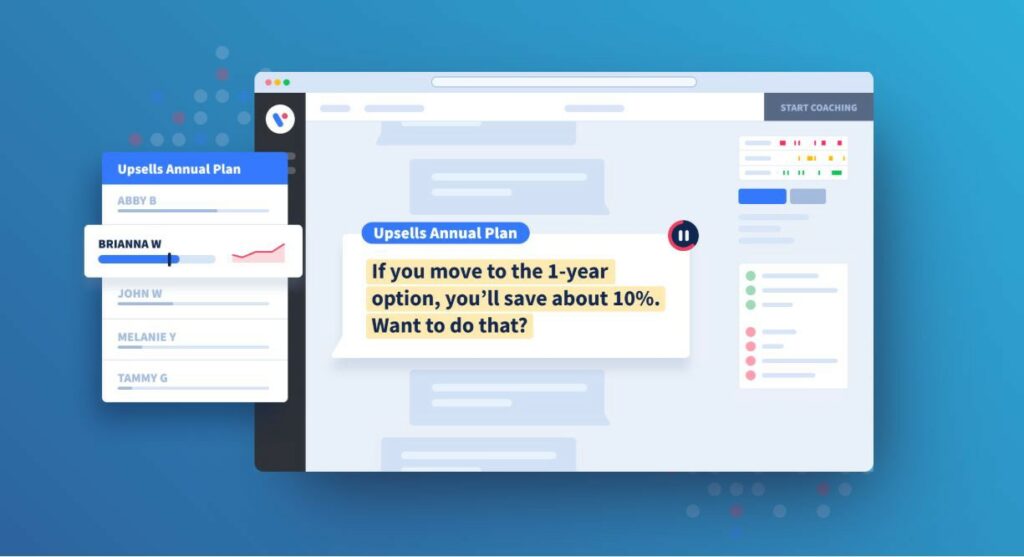
Selective State Space Models: Solving the Cost-Quality Tradeoff
As AI is increasingly used in production scenarios, costs are mounting. Are alternative architectures the solution?

We are excited to announce our Series A investment in VoiceOps, a provider of voice analytics technology for sales coaching, backing a tenacious team that has already demonstrated compelling customer value in a crucial enterprise market.
VoiceOps leverages machine-learning driven annotation and labeling of voice recordings to provide analytics and insights to sales managers on individual sales rep performance. With VoiceOps, call center managers can identify specific sales behaviors that need reinforcing, and provide direct coaching and guidance via the VoiceOps workflow software. Sales reps get more (and more accurate) coaching, hence customers get better service, and the business benefits from sales growth.
In fact, within 30 days, typical VoiceOps customers have seen improvements in actual sales close rates upwards of 25 percent. This kind of ROI, let alone in that timeframe, is unheard of in B2B software. Along with the massive market opportunity and singularly determined team, that impact was the lynchpin behind our excitement to invest in VoiceOps.
Voice of the (Enterprise) Customer
The leaps forward in speech-to-text and natural language processing have attracted engineers and founders of all stripes. While voice applications are popping up in our homes and cars, a range of use cases are also emerging at work.
Several companies have gained traction by selling into inside sales teams, where sales representatives are on the phone constantly, and selling skills are crucial to closing business and growing revenue. In this space, we believe there are two segments emerging, with market leaders in each: in business-to-business sales, companies including Gong, Chorus, and Dialpad’s TalkIQ are winning customers. On the other hand, VoiceOps is emerging as the early leader in business-to-consumer sales.

VoiceOps’ customers are typically operating large-scale contact centers, selling travel, education, and insurance, among other consumer and financial services. They may have coaches on staff who manually listen to call recordings and provide guidance relative to established call flows and best practices, though this is tough to scale given the volume of calls they receive. They are operating on trusted telephony providers, but previously lacked a partner for call analysis and coaching.
At the same time, these companies are among the most poised to benefit. They make far more calls per day than the B2B world, have higher turnover, hire folks with lower sales experience, and deals happen in the span of one to two calls. That means that better coaching can translate to higher revenue in literally days.
Hearing Results Clearly
That fact is abundantly clear among VoiceOps’ customers. Within 30 days, typical VoiceOps customers have seen improvements in actual sales close rates upwards of 25 percent, which is unprecedented in B2B sales. In the process of getting to know the company, we were fortunate to hear these stats from customers firsthand:
● “The biggest value has been the ability to triple the amount of coaching… we’ve seen a 20 percent uplift as a result.” — Director of Inbound Sales
● “We were shocked to learn that our representatives were failing to execute basic steps in the sales process. With VoiceOps, we focused our coaching, resulting in improvements of close rates approaching 15 percent.” — Director of Sales
● “It’s changed the way we provide coaching to our team. We can highlight specific behaviors and provide tips and guidance directly in the VoiceOps workflow — which has a direct result in sales team execution.” — Founder
The sales managers we spoke with told us they have never seen transcripts or labels live up to claims of accuracy, until VoiceOps. Managers raved about the coaching tools built on top of those transcripts, helping them easily and quickly annotate individual sentences, providing their front-line team with in-depth feedback and guidance. A director of sales at Penn Foster told us that she walked into the pilot kickoff with extreme skepticism, and walked out of the room declaring herself a “true believer.”
We share a belief with the VoiceOps team that automation is making sales representatives — and the customer relationships they forge — more critical than ever before. In an age where less complex calls are deflected by AI agents, the conversations you have with a human are more high-stakes. Better coaching and training was always important, but now it’s essential. The notion that “AI + Humans” leads to better sales and higher revenue is a key, foundational element of the VoiceOps vision.
A Team on the Same Wavelength
The technology and market tailwinds are as convincing as VoiceOps’ commercial momentum, but in any venture investment, our decision-making ultimately hinges on the team. Ethan and Nate, co-founders of VoiceOps, are building on a foundation of great technology backgrounds; Ethan produced educational content at General Assembly, while Nate was a data scientist at Linkedin.
They are both incredibly customer-centric, which has manifested in a highly focused product roadmap and a commitment to customer success. They built a structured and repeatable enterprise sales process, which is rare to find in a company of this stage. We spent hours with the founders understanding their product vision and roadmap, and they consistently emphasized the importance of clarity, simplicity, and delivering measurable impact immediately. Ethan and Nate are world-class founders who have built a culture of a relentless focus on meaningful customer value, which is the hallmark of a long-term, valuable company.
Ethan, Nate: welcome to the BCV family! We’re honored and excited to work with you, applying cutting-edge technology to help every sales representative — and company — improve their performance and results.
As AI is increasingly used in production scenarios, costs are mounting. Are alternative architectures the solution?
Cube is the standard for providing semantic consistency to LLMs, and we are investing in a new $25M financing after leading the seed round in 2020.
In this edition of “In the Lab,” Amit Aggarwal explains why he’s building an AI startup in BCV Labs after selling his company The Yes to Pinterest.